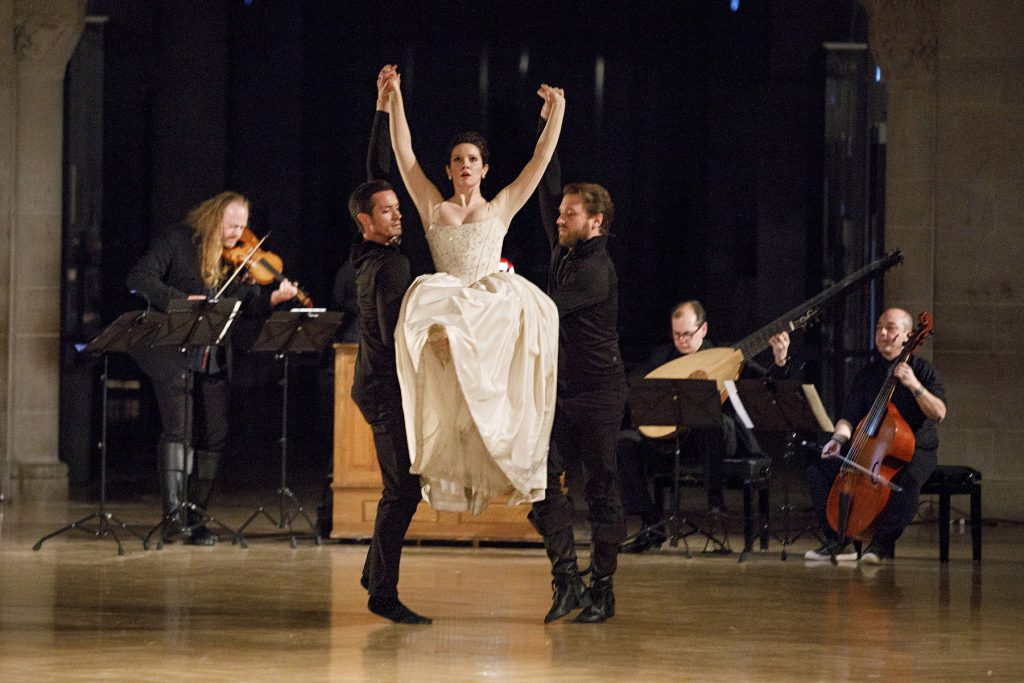Completed in 1710, Louis XIV’s dazzling Chapelle royale de Versailles, polychromatic marble floor to soaring frescoed vault, is if not geographically then certainly a metaphorical world apart from the rather more down-to-earth Samuel Hall Currelly Gallery at Toronto’s Royal Ontario Museum. Repurposed and renovated in the early 2000s as a multi-functional special events venue, the former exhibition-cum-gathering space radiates purposefulness, an imposing LED-lit dinosaur skeleton and scattered showcases punctuating the otherwise understated setting.
Reprising its crossover Baroque concert offering, The Angel Speaks, premiered in Versailles in December 2018, Canada’s early opera ambassador-at-large, Opera Atelier, eagerly pushed beyond the limits of appointed time and place at ROM last Thursday night. Blending period performance with a distinctly contemporary approach to music and expression, singer-actors, dancers and ensemble players seamlessly partnered one another in an inspiring demonstration of theatrical kinship. The palpable religiosity so vividly apparent in the company’s original presentation of the intense, one-hour performance piece directed by Marshall Pynkoski, the overt transcendent values that flowed so freely in the charged Rococo milieu of the Chapel Royal, were, if not supplanted, then largely overwritten by a powerful sense of shared humanity.
Traversing successive selections by Henry Purcell in the first half of the program with a passing nod to William Boyce, singers Jesse Blumberg and Mireille Asselin joined by a compact corps of artists drawn from Atelier Ballet all masterfully supported by members of Tafelmusik enchanted in a gently eclectic program.
The need to compartmentalize music in the late 17th century was infinitely less compulsive than it is today. Secular and religious, the sacred and the profane, style and form frequently intertwined. Nimble craftsmen like Purcell invested their sacred works with all the drama and emotional rise and fall of a wholly theatrical experience. A deft hand at masque and opera, one of the very first native-born composers to write English music drama, Purcell forever kept at least one leg on the actorly side of the footlights. Airs like Music for a While, richly voiced by Blumberg by way of ROM concert prelude, and occasional songs on the order of See Nature Rejoicing, Asselin’s bright crystalline instrument topping Purcell’s courtly soprano-baritone duet, epitomize the composer’s ability to command attention. Songs of all sorts, theatre music, hymns and anthems, it was all music to Purcell’s ears. His devotees then and now adored it, the capacity Queen’s Park museum audience quite clearly no exception.
A pair of original compositions by Baroque/folk violinist Edwin Huizinga seized centre stage in part two of the evening. The first, a cantata entitled Annunciation, recently commissioned by Opera Atelier with text by metaphysical modernist poet Rainer Maria Rilke poignantly detailed the Archangel Gabriel’s sudden appearance before a fearful, ultimately wonderstruck Virgin. The news he bears is both startling and mysterious. Sung by Blumberg with exquisite intensity as the voice of the Angel, danced with stunning grace by choreographer/OA principal artist Tyler Gledhill as Gabriel witnessed in physical form, the encounter, as tenderly set by Huizinga, assumed inexpressibly poignant dimensions.
Leaping from the delicacy of the moment to the turmoil of Purcell’s The Blessed Virgin’s Expostulation, Asselin gifted us with a particularly touching portrayal of the Madonna, simultaneously human and holy, fearful and exultant.
Huizinga’s 2017 inaugural work for Opera Atelier, Inception, a haunting divertimento for solo violin and dancer — Gledhill dynamic and ecstatic, Huizinga’s playing tinted with driving Celtic overtones — closed the chapter on the discrete trio of potent interrelated scenes.
Baroque dancers in motion, meticulously choreographed by Jeannette Lajeunesse Zingg, physical embodiments of all the persistent wonder and devotion implicit in music director David Falllis’ resonant programming, brought the concert to a close, Asselin’s glowing rendition of Purcell’s An Evening Hymn illuminating the hall. Peacefully playing at the head of the long, narrow space, Tafelmusik calmed the heart, Charlotte Nediger’s lovely chamber organ profoundly serene.
Spellbinding, captivating, The Angel Speaks spoke. As it has done so vibrantly so very many times before, Opera Atelier movingly articulated its unique artistic vision.
* * *
Above: Edwin Huizinga, Jesse Blumberg, Mireille Asselin, Tyler Gledhill, Members of Tafelmusik. Photo by Bruce Zinger


